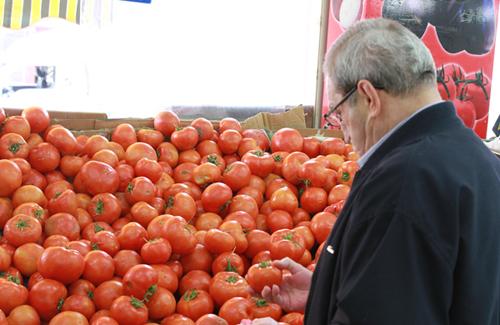You are here
Consumer protection report finds ‘steep’ rise in price of produce
By Maram Kayed - Dec 04,2018 - Last updated at Dec 04,2018

After receiving numerous complaints about produce prices, the National Society of Consumer Protection launched a study, which was recently released and detailed ‘steep’ rises in the prices of fruit and vegetables (JT file photo)
AMMAN — The National Society of Consumer Protection (CPS) has recently expressed concerns over what it described as “steep” and “unrealistic” hikes in the price of produce.
CPS’s President Mohammed Obeidat said in a press conference on Monday that the society decided to conduct a field study of the local market, having received continuous complaints from people about “unbearable” hikes in prices of basic commodities.
Essential vegetables used in everyday meals such as tomatoes, potatoes and onions had risen between JD0.3 to JD0.5 per kilogramme, the study said.
According to the study, a copy of which was made available to The Jordan Times, the prices of fruits such as imported bananas had also been raised, notably more than vegetables.
“At a time when around 60 per cent of people cannot afford meat or chicken, it is illogical to raise prices of vegetables,” Obeidat said.
Produce store owners who spoke with The Jordan Times said that the demand has been very low recently, with some requesting that deliveries be made to customers every two days rather than on a daily basis.
“Who would buy a kilo of persimmon (locally known as “kaka”) at JD3? I know people whose daily income is only JD5,” said Abu Jihad, who owns a fruit and vegetable store in Amman’s Dahyet Al Amir Hassan. “Fruits are luxuries that many people cannot afford.”
Fruit market owners said they could not sell their products without making a profit, and that when wholesale owners raise prices, they have to follow suit.
“Why are we in this business if we are not going to make a profit? For example, if the price of imported bananas is raised to JD1.5, we cannot keep selling them at JD1 per kilo to make customers happy,” said Samer Harb, another store owner.
Obeidat stressed that the prices should be set by the Amman Chamber of Commerce in a way that guarantees the benefit to both buyer and seller.
According to studies by the World Bank, the agricultural sector contributed 4 per cent to the GDP in 2018. In 2016, total agricultural exports reached JD530 million, while imports exceeded JD2 billion.
“Being this dependent on imports means we cannot control price-setting procedures. Moreover, when it comes to local produce, the government thinks that raising prices benefits farmers by increasing profits, but it in fact harms them when demand is this low,” concluded Obeidat.
Related Articles
AMMAN — As prices of some vegetables have been on the rise over the past weeks, the Consumer Protection Society (CPS) accused retailers of b
AMMAN — After complaints by citizens that some merchants and shop owners are raising the prices of fruit, vegetable and other food commoditi
AMMAN — Shoppers are complaining about the prices of fruit and vegetables, as the price of tomatoes reached JD0.89 a kilogramme on Monday.&n


















